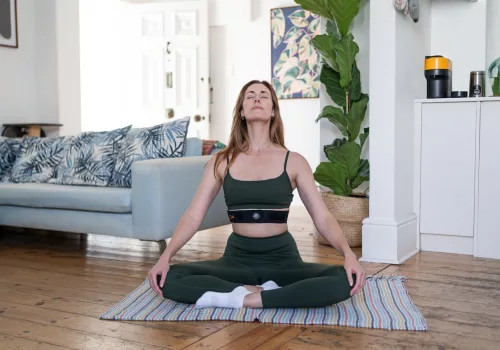Yoga, a practice combining physical postures, breathing techniques, and mindfulness, has gained global recognition for its ability to manage stress and improve overall well-being. In today’s fast-paced world, stress often impacts both the body and mind, leading to a range of health issues. Yoga offers a holistic solution to address these challenges, allowing individuals to cultivate inner calm, improve physical health, and enhance emotional resilience.
Yoga is accessible to people of all ages and fitness levels, with a variety of styles and intensities to suit individual preferences. Whether practiced at home or in a group setting, yoga can help reduce tension, promote mental clarity, and foster a deeper sense of connection with oneself. Below, we delve into 15 expanded benefits of yoga for stress management, illustrating how this ancient practice can transform your response to stress and enhance your quality of life.
1. Promotes Relaxation
Yoga is renowned for its ability to induce a state of deep relaxation. Through slow, deliberate movements and controlled breathing, yoga helps activate the parasympathetic nervous system, also known as the “rest and digest” system. This physiological shift counteracts the “fight or flight” response triggered by stress, calming the body and mind.
Specific poses, such as Child’s Pose, Corpse Pose (Savasana), and Legs-Up-the-Wall Pose, are particularly effective in promoting relaxation. These postures encourage the release of tension in the muscles, reduce heart rate, and lower blood pressure. Over time, regular yoga practice can train your body to respond to stress with calmness and ease, improving overall resilience to life’s challenges.
2. Reduces Cortisol Levels
Cortisol, commonly known as the “stress hormone,” is released by the adrenal glands in response to stress. While this hormone is essential in small amounts, chronic stress can lead to consistently elevated cortisol levels, contributing to anxiety, weight gain, and a weakened immune system.
Yoga has been shown to reduce cortisol levels significantly. Breathing techniques like Ujjayi (ocean breath) and restorative poses such as Reclining Bound Angle Pose create a calming effect, helping the body lower cortisol production. By reducing cortisol, yoga not only alleviates immediate stress but also mitigates long-term health risks associated with chronic stress.
3. Improves Emotional Resilience
Stress can make emotions feel overwhelming, leading to anxiety, frustration, or even despair. Yoga helps cultivate emotional resilience by teaching you to remain present and composed, even during challenging situations.
Through mindful movement and breath awareness, yoga encourages a calm and thoughtful response to stressors rather than an impulsive reaction. Practices such as meditation and yin yoga allow you to observe your thoughts and emotions without judgment, helping you gain better control over your emotional responses. This emotional balance can improve relationships, work performance, and overall mental health.
4. Enhances Mindfulness
Mindfulness is a core aspect of yoga, focusing on the present moment rather than dwelling on the past or worrying about the future. Yoga encourages practitioners to tune into their breath, bodily sensations, and movements, cultivating a sense of awareness and presence.
Mindfulness helps break the cycle of overthinking, which often exacerbates stress. By concentrating on the here and now, yoga fosters a sense of calm and clarity. This heightened awareness can carry over into daily life, allowing you to approach stressful situations with a balanced and measured mindset.
5. Relieves Physical Tension
Stress often manifests physically, causing tightness in the shoulders, neck, back, and other areas of the body. Over time, this tension can lead to chronic pain and reduced mobility. Yoga targets these areas of tension through gentle stretching, strengthening, and alignment-focused postures.
Poses like Cat-Cow Pose, Forward Fold, and Seated Spinal Twist release stiffness and increase flexibility. Deeper stretches, such as Pigeon Pose and Reclined Twist, target the hips and lower back, which are common areas for stress-related tightness. Regular practice helps relieve physical tension, improving overall comfort and relaxation.
6. Improves Breathing Patterns
Breathing is a powerful tool for managing stress, and yoga places significant emphasis on breath control. Stress often leads to shallow, rapid breathing, which can exacerbate feelings of anxiety and fatigue. Yoga introduces pranayama (breath control) techniques that promote deep, diaphragmatic breathing.
Practices such as Nadi Shodhana (alternate nostril breathing) and Brahmari (humming bee breath) help calm the nervous system and increase oxygen flow to the brain. These techniques not only reduce stress but also enhance mental clarity and focus, empowering you to navigate stressful situations with greater composure.
7. Supports Better Sleep
Stress is one of the leading causes of sleep disturbances, including insomnia and poor-quality rest. Yoga addresses this issue by calming the mind and relaxing the body, preparing you for restorative sleep. Certain poses, like Legs-Up-the-Wall Pose and Supine Twist, are particularly effective for reducing restlessness and tension before bedtime.
Additionally, practices like Yoga Nidra (guided relaxation) can help you enter a state of deep rest, even if you struggle to fall asleep. By improving sleep quality, yoga enhances your body’s ability to recover from stress and maintain overall well-being.
8. Enhances Focus and Concentration
Stress often scatters the mind, making it difficult to concentrate or complete tasks efficiently. Yoga helps sharpen focus by encouraging you to direct your attention to your breath, movements, or a specific point of concentration (drishti).
This practice of sustained attention strengthens your mental faculties and reduces distractions. Improved focus not only enhances productivity but also minimizes the mental clutter associated with stress, allowing you to approach tasks with clarity and purpose.
9. Boosts Mood
Yoga is a natural mood booster, thanks to its ability to increase the production of endorphins and serotonin. Endorphins are the body’s natural painkillers and stress relievers, while serotonin is associated with feelings of happiness and well-being.
The combination of physical activity, breathwork, and mindfulness in yoga creates a powerful trifecta for improving mood. Regular practice can reduce symptoms of anxiety and depression, replacing feelings of overwhelm with a sense of calm and positivity.
10. Cultivates Self-Awareness
Yoga encourages introspection and a deeper understanding of your thoughts, emotions, and physical sensations. This heightened self-awareness helps you identify stress triggers and develop healthier coping mechanisms.
By regularly checking in with yourself during yoga practice, you can become more attuned to your body’s signals and emotional state. This self-awareness fosters better decision-making and enables you to respond to stress in a proactive and mindful way.
11. Strengthens the Mind-Body Connection
The integration of movement, breath, and mindfulness in yoga strengthens the connection between the mind and body. This connection allows you to recognize how stress impacts both your mental and physical states, empowering you to take control of your well-being.
For example, by noticing physical tension during yoga, you can address stress before it escalates. Strengthening this mind-body connection helps you cultivate a greater sense of harmony and balance in your daily life.
12. Encourages Healthy Lifestyle Choices
Yoga often inspires practitioners to adopt a more mindful and balanced approach to life. Many people find that their yoga practice motivates them to make healthier choices, such as eating nutritious foods, prioritizing self-care, and reducing unhealthy habits.
These positive lifestyle changes complement yoga’s stress-reducing benefits, creating a cycle of well-being that supports both physical and mental health. Over time, yoga becomes a cornerstone of a healthier and more fulfilling life.
13. Provides a Sense of Community
Participating in yoga classes fosters a sense of belonging and connection with others. Sharing a practice with like-minded individuals creates a supportive environment where you can feel understood and encouraged.
This sense of community is particularly valuable during stressful times, as it helps reduce feelings of isolation and loneliness. The positive energy and camaraderie in a yoga class can uplift your spirits and reinforce your commitment to managing stress effectively.
14. Increases Adaptability
Yoga teaches you to embrace challenges and discomfort with patience and grace. By holding poses that test your strength, balance, or flexibility, you learn to remain calm and focused under pressure.
This adaptability extends beyond the mat, helping you navigate life’s stressors with greater resilience. Yoga empowers you to approach difficult situations with a sense of curiosity and confidence, transforming obstacles into opportunities for growth.
15. Offers a Healthy Escape
Yoga provides a dedicated time and space to disconnect from the demands of daily life. Stepping onto the mat allows you to pause, breathe, and focus solely on your well-being, offering a much-needed mental reset.
This escape from stressors creates a sense of renewal, helping you return to your responsibilities with a clearer mind and calmer demeanor. Over time, yoga becomes a sanctuary where you can recharge and cultivate inner peace, no matter how chaotic life may seem.
Yoga is more than just physical exercise—it is a powerful practice that nurtures the mind, body, and spirit, making it an invaluable tool for managing stress. With its combination of mindful movement, controlled breathing, and meditative focus, yoga provides a holistic approach to reducing tension, improving emotional resilience, and promoting overall well-being.
Through regular practice, yoga helps you relax your body, calm your mind, and develop the tools to handle life’s challenges with greater ease and confidence. It cultivates self-awareness, sharpens focus, and fosters a sense of adaptability, enabling you to face stressors with clarity and composure.
Whether you’re looking to relieve physical tension, improve your mood, or simply find a moment of peace amidst a busy day, yoga offers something for everyone. By making yoga a part of your routine, you can create a sanctuary for yourself—a space to recharge, refocus, and build the resilience needed to thrive in today’s fast-paced world. Start small, stay consistent, and let yoga guide you toward a more balanced, stress-free life.






